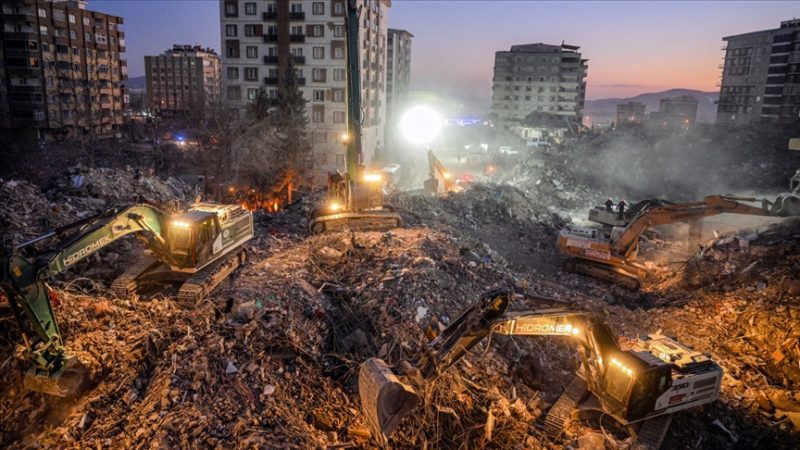Despite the progress of industry and technology, humans continue to be the weak spot in the face of nature. The devastating earthquakes that shook on February 6, 2023, the southeast of Türkiye and the northeast of Syria are new evidence of impotence facing natural disasters.
The two earthquakes of 7.6 and 7.7 have claimed the lives of more than 50.000 people in Türkiye and, 8500 in Syria. Turkish President Erdogan Tayyip Recep called the earthquake “biggest catastrophe in the history of the country since 1939”, while President Assad of Syria described is country’s situation afterward as “catastrophic”.
The natural disasters of February affected mostly the border region between Türkiye and Syria, with the Turkish provinces Hatay, Kahramanmaraş and Adıyaman and the Syrian provinces of Idleb, Latakia, Tartus, Aleppo, Hama and Al Raqqa facing the biggest damage.
The first earthquake’s epicenter was located 18 km below the surface, while the second’s was 10 km below earth. The low depth of the epicenter caused serious damage on the surface.
Another important factor was the time the earthquakes occurred. Both happened in the very early morning hours, catching residents while asleep and therefore unable to escape the buildings.
In Türkiye, the violation of actual construction laws had consequences. More than 1,300 people were investigated, with at least 300 being arrested, due to construction of buildings that crushed down too easily, burying their residents below them.
It turned out that construction standards were fulfilled only on paper.
Though Türkiye is a geography of serious seismic activity, the recent dozens of years have not shown major earthquakes. That explains the poor state of emergency preparations in comparison to other countries.
In case of Syria, one can also not speak of existing standards of security in construction, though this is, in comparison to Türkiye, less surprising given the Arab country’s political and economic situation. In Syria’s northeast, government forces are continuing to fight against armed oppositional groups and terror organizations, therefore, it is not possible to speak of good building conditions. Lots of people live in tents and improvised housing and face a humanitarian crisis due to the lack of food, water, gasoline and medicine.
Reconstruction
And of last years’ month of March, Ministry of Finance estimated that the catastrophe had caused a damage of 2 trillion Turkish Liras, equivalent to approximately 105 billion dollars.
According to Recep Erçin, economy journalist of Turkish daily newspaper Aydınlık, the government has spent from the public budget 34.5 billion US Dollars to fight the earthquakes’ results, and “it will pay much more” in 2024.
The disaster has destroyed 820,000 fully or in part. Authorities have mobilized resources to construct more than 100 thousand containers for half a million of citizens.
Construction is expected to be completed in the coming summer. Türkiye is a “strong manufacturer of those construction materials”, emphasized Erçin, but given that a very wide area is affected and labor lacks in the region, reconstruction will take time.
The journalist tells Sputnik Agency that in Hatay, the province most affected, 85% of the damaged infrastructure has been removed. But still, some buildings wait to be demolished.
Aid continues to arrive to affected people. Special projects are being developed for women and children. The government has provided the necessary emergency aid, and now, “more responsibility falls upon companies and private initiatives”.
Besides, the government has started to announce temporal employment in the affected area, with the wages supported from the public budget.
Public spending is the most important factor to compensate for the losses after the disasters. Erçin emphasized that loans from the World Bank also benefit Turkish business organizations.
Mehmet Perincek, a Turkish political scientist and historian, tells Sputnik that the situation gets worse due to the pressure of the United States on Türkiye, where Ankara rejects to apply sanctions against Russia. Furthermore, the country is fighting against the PKK, considered a terror organization in Türkiye, and the actual increasing violence in the Gaza Strip.
Notwithstanding, Türkiye’s interaction with neighbors and allies supports the affected region’s security as well as the economy of the country. Despite the difficulties, Ankara has not renounced the idea of creating a center to distribute Russian gas to Europe on Turkish soil.
“The sanctions are obviously antihuman, but they have also generated great opportunities for Türkiye”, says Perinçek. The country “will turn into an economic, financial and energy center”, both for Russia and for other countries that maintain economic relations with it.
By that, says the expert, “can Türkiye gain the necessary resources to solve problems related to the effects of the earthquake”, such as the reconstruction of affected cities and the rebuilding of houses.
Moreover, income from the tourism sector is important to overcome the climate disaster. Data from the Ministry of Tourism indicates that during the first months of 2023, 13 million tourists visited Istanbul, an increase by 11.6 in comparison to the previous year.
According to the Minister of Culture and Tourism, Mehmet Ersoy, Türkiye expects to receive 60 million tourists in 2023 and achieve an income of 56 billion US Dollars.
In regard to Syria, the authorities approved end of April a national action plan to fight the effects of the earthquakes.
At that time, 50 thousand buildings in the area controlled by the government were needing structural support.
The United Nations Emergency Action Fund (CERF) provided 15 million dollars in rapid response, dealing with almost 900 thousand affected people in Syria, and an additional 25 million USD “for emergencies related to insufficient finance”, a payment that is still in process of implementation.
Both countries still have a lot to do to recover from the earthquakes, but certain progress is visible in the reconstruction efforts 10 months after the disaster. This provides hope that in 2024, the situation will get better and the effects of the disaster won’t be that visible anymore – although for the witnesses of this tragedy, there will always be a before and after.









Leave a Reply